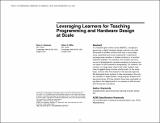Leveraging Learners for Teaching Programming and Hardware Design at Scale
Author(s)
Glassman, Elena L; Miller, Robert C
Downloadcscw-glassman-miller-demo.pdf (460.5Kb)
PUBLISHER_POLICY
Publisher Policy
Article is made available in accordance with the publisher's policy and may be subject to US copyright law. Please refer to the publisher's site for terms of use.
Terms of use
Metadata
Show full item recordAbstract
In a massive open online course (MOOC), a single pro-gramming or digital hardware design exercise may yield thousands of student solutions that vary in many ways, some superï¬ cial and some fundamental. Understanding large-scale variation in student solutions is a hard but important problem. For teachers, this variation can be a source of pedagogically valuable examples and expose corner cases not yet covered by autograding. For students, the variation in a large class means that other students may have struggled along a similar solution path, hit the same bugs, and can offer hints based on that earned expertise. We developed three systems to take advantage of the solu-tion variation in large classes, using program analysis and learnersourcing. All three systems have been evaluated using data or live deployments in on-campus or edX courses with thousands of students.
Date issued
2016-02Department
Massachusetts Institute of Technology. Computer Science and Artificial Intelligence Laboratory; Massachusetts Institute of Technology. Department of Electrical Engineering and Computer ScienceJournal
Proceedings of the 19th ACM Conference on Computer Supported Cooperative Work and Social Computing Companion (CSCW 2016)
Publisher
Association for Computing Machinery (ACM)
Citation
Glassman, Elena, and Miller, Robert. “Leveraging Learners for Teaching Programming and Hardware Design at Scale.” Proceedings of the 19th ACM Conference on Computer Supported Cooperative Work and Social Computing Companion (CSCW 2016) (February 2016): 37-40 © 2016 Association for Computing Machinery (ACM)
Version: Final published version
ISBN
978-1-4503-3950-6